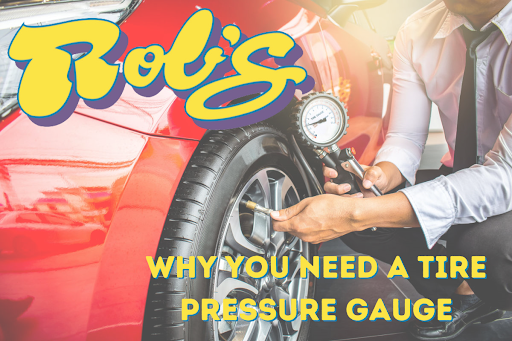Why You Need a Tire Pressure Gauge
July 24, 2023


Do you ever hear that little warning light go off on your dashboard, telling you that it’s time to check your tire pressure? Sure, it may seem like a minor issue – after all, what harm can low tire pressure really do? The truth is, checking and maintaining proper tire pressure in your vehicle is one of the easiest and most important steps you can take towards ensuring safe driving conditions.
Not only does keeping properly inflated tires help increase the life of your vehicle’s tires, but it also helps improve gas mileage while reducing wear-and-tear on other car components. Understanding the why behind the importance of having a reliable tire pressure gauge will ensure that not only are you prepared for any issues with inaccurate or unreliable readings so out on the road – no matter if it’s near home or across country!
What is a tire pressure gauge and why do you need one
A tire pressure gauge is a simple yet essential tool used to check the air pressure in your vehicle’s tires. It measures the pressure in pounds per square inch (psi) and can help ensure that your tires are inflated to the correct level. Having proper tire pressure can lead to better fuel efficiency, improved handling, and increased safety on the road. Without a tire pressure gauge, it can be difficult to determine if your tires are properly inflated simply by eyeing them.
Underinflated or overinflated tires can cause a variety of problems from decreased gas mileage to increased risk of a blowout. A tire pressure gauge is a relatively inexpensive and easy-to-use tool that can save you headaches and potentially costly repairs down the road.
How to use a tire pressure gauge to check your tires
Are you unsure about the proper way to use a tire pressure gauge to check your car’s tires? It’s a question that many car owners have. But luckily, it’s relatively straightforward. Firstly, locate your car’s recommended tire pressure in the owner’s manual or on the inside of the driver’s side door. Then, unscrew the valve cap on one of your tires, and firmly press the gauge onto the valve stem until you hear a small hiss sound.
The gauge will provide you with a reading that indicates whether your tire pressure is too low, too high, or just right. It’s crucial to check your tire pressure regularly to ensure that your vehicle is as safe and efficient as possible.
Benefits of maintaining your tires with a tire pressure gauge
Maintaining your tires with a tire pressure gauge can bring a wide range of benefits to your driving experience. For one, properly inflated tires help improve fuel efficiency, saving you money on gas in the long run.
Your vehicle’s handling and overall performance can also improve with correctly inflated tires, creating a safer driving environment. It’s important to note that tire pressure can fluctuate due to changes in temperature and road conditions, so regularly checking with a tire pressure gauge is key.
By taking the time to maintain your tires, you’ll not only increase their lifespan but also ensure a smooth and comfortable ride for you and your passengers.
Common mistakes people make when using a tire pressure gauge
Maintaining proper tire pressure is crucial for safe driving and prolonging the life of your tires. However, using a tire pressure gauge can be tricky, and many people make common mistakes that could lead to inaccurate readings or even damage to the tire.
One of the most common mistakes is failing to check the pressure when tires are cold, as driving heats up the air in the tire and increases pressure.
Another mistake is using a gauge that is not calibrated or properly maintained, which can result in readings that are off by several pounds. It’s also important to check the pressure in all four tires, as uneven pressure can cause handling issues and wear on the tires.
Avoiding these common mistakes and following proper tire pressure guidelines will help keep you safe on the road and maximize the life of your tires.
Different types of tire pressure gauges available on the market today
Maintaining the correct tire pressure is vital for ensuring your safety while driving, improving fuel efficiency, and extending your tire’s lifespan. And the best way to measure tire pressure accurately is by using a tire pressure gauge. However, with so many types of tire pressure gauges available on the market today, it can be confusing to choose the right one for your needs.
Some of the most popular types include digital gauges, dial gauges, stick gauges, and pencil gauges, each with its own advantages and disadvantages. Digital gauges, for instance, provide quick and precise readings and are easy to read in low light.
On the other hand, dial gauges offer high accuracy and precision, while pencil gauges are simple and affordable options. Knowing the features, pros, and cons of each type will help you choose the best tire pressure gauge for your purposes.
Tips for buying the right tire pressure gauge for your needs
Ensuring your vehicle’s tire pressure is correctly maintained can vastly improve handling, fuel efficiency, and may even save you money on future repairs. However, without the right equipment, checking tire pressure can be difficult. A high-quality tire pressure gauge can help make this task simple and stress-free.
With so many options available, it’s important to consider what features are most important to you. Some gauges offer a digital display, while others are designed for specific types of tires. Additional features like built-in flashlights or air-release valves could also affect your decision. By shopping for a gauge that suits your specific needs, you can ensure that your tire pressure is correctly maintained and your vehicle is operating at its best.
All in all, a tire pressure gauge is a handy tool to maintain the right tire pressure and keep your vehicle safe and on the road. As a general rule of thumb, use a tire pressure gauge once a month or every time you fill up with fuel. Be sure to check the user manual for detailed instructions for accurate readings. When purchasing a tire pressure gauge, be sure to consider its features such as accuracy, pressure range, simplicity of operation, durability, and compatibility with different tire valves.
Taking regular preventative maintenance measures like using a tire pressure gauge will not only ensure that your tires stay in good condition but also maximize gas mileage and prolong their lifespan.
Finally, remember to always contact Rob’s Automotive for all your car or truck needs! With knowledgeable technicians utilizing the necessary tools and equipment to tackle any automotive problems you may have, you can trust them to keep your car running reliably. We specialize in all aspects of vehicle maintenance and upkeep, including heavy duty truck repair and offer towing services throughout the Philadelphia, PA, area. Rob’s is also certified by 24 major auto manufacturers, so you can always trust our team to provide you with unparalleled customer service and high-quality repair services.
